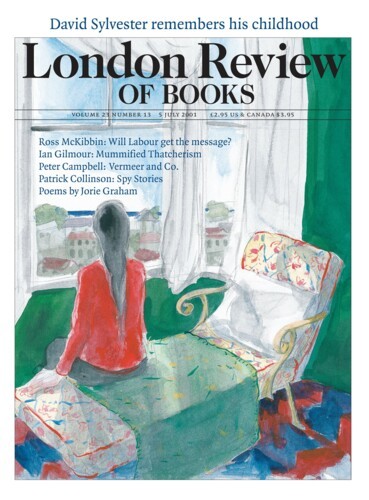Announcing the winner of this year’s Samuel Johnson Prize, Andrew Marr was pleased to be able to say that none of the shortlisted books was the obvious result of a publisher’s ‘wheeze’, or the so-called biography of something which couldn’t in all honesty be said ever to have had a life. One of the more glaring recent additions to the latter category is Cocaine: An Unauthorised Biography by Dominic Streatfeild (Virgin, £20). How, even supposing a ‘biography’ of the drug is possible, would you set about getting it authorised? Who would you ask? George W. – ‘W’ in this instance standing for ‘When I was young and irresponsible, I was young and irresponsible’ – Bush? Or perhaps the Queen, within yards of whom, the Evening Standard was shocked to report, other representatives of the supra-legal idle rich were snorting the stuff in the Royal Enclosure at Ascot.
Due in September is The Secret Life of Dust by Hannah Holmes (Wiley, £16.99). Desiccated handfuls are thankfully absent from the book, and Holmes has interesting things to say about air pollution, asbestosis, climate change, dinosaur extinction, viruses, wheezing; but ‘dust’ is a cloudy category – cocaine, for example, can be dust, though it doesn’t feature in Holmes’s book. In the introduction, she defines a dust particle as anything smaller than 63 microns (a micron is a thousandth of a millimetre). Anything larger is sand; she doesn’t say at what size sand turns into gravel. A footnote acknowledges that, ‘technically’, what she calls dust ‘a geologist would divide into “silt” and “clay”. Some geologists draw the sand/silt line at 63 microns, others at 60 or even 50.’ Cement dust ranges from three to 100 microns, which seems to mean that some cement dust doesn’t qualify as dust. But since a Holmes micron is defined as one 25,000th of an inch, which makes it a bit longer than a normal micron, why fuss over minutiae? ‘This is not,’ Holmes writes, ‘a technical book.’
If a book can’t be recast in its subtitle as the biography of its subject, the next best thing is for it to appear as a self-help book. Alain de Botton’s Consolations of Philosophy, a model of its kind, came out in paperback in the spring. Playing, in a manner of speaking, Achilles to de Botton’s tortoise, Nicholas Fearn’s Zeno and the Tortoise: How to Think like a Philosopher is to be published in the autumn. Fearn ‘dusts off 24 great philosophers in 25 miraculously short chapters’, ‘each readable during the journey to work’: never let philosophy get in the way of the daily grind. It all makes thinking like a philosopher sound very easy; but I’d imagine one of the more reliable criteria for distinguishing between philosophical thought and the bog standard kind would be that philosophical thinking is precisely not easy. A more realistic and useful book for most of us would be called something like ‘Derek the Tortoise: How to Think like a Chelonian’, and offer ways of thinking that would enable readers to keep their heads down, take things slowly, enjoy eating lettuce, live for a very long time – that kind of thing.
At Theory.org.uk, which provides ‘social theory for fans of popular culture’ and ‘popular culture for fans of social theory’, it looks at first as if you can get ‘action figures’ of Foucault and Anthony Giddens. Both models are 16 cm high. Giddens comes ‘equipped with a copy of his outstanding Modernity and Self-Identity’. Foucault, ‘shrouded in a special removable French cloak and with a built-in thoughtful head movement’, ‘waves his baton in post-structuralist style at all challenges’. Anyone who wishes to buy a figure can send off $14.99, quoting the relevant catalogue number (THEOR-01-69-GID or THEOR-02-69-FOU). While looking for the supplier’s address, however, you might come across the answers to some ‘frequently asked questions’: sadly, ‘the action figures exist only as bits and bobs in cyberspace’. The man responsible for the site, David Gauntlett, who teaches at the Institute of Communications Studies in Leeds, is clearly a bit of a Giddens fan: note the description of Modernity and Self-Identity as ‘outstanding’. You can also get (if you download and print them) Theory.org.uk ‘trading cards’, which are modelled on Pokémon. Gauntlett’s bias is again evident here: most of the featured theorists have ‘weaknesses’; the great Giddens only ‘risks’ attack from ‘misguided Post-Modernists’. Giddens doesn’t warrant a chapter in Zeno and the Tortoise, but he’d no doubt have a strong presence in ‘Social Theory: The Authorised Biography’, should Gauntlett choose to write it. Lucky readers could even get a free cellophane-wrapped action figure attached to the front of the book.
Send Letters To:
The Editor
London Review of Books,
28 Little Russell Street
London, WC1A 2HN
letters@lrb.co.uk
Please include name, address, and a telephone number.

